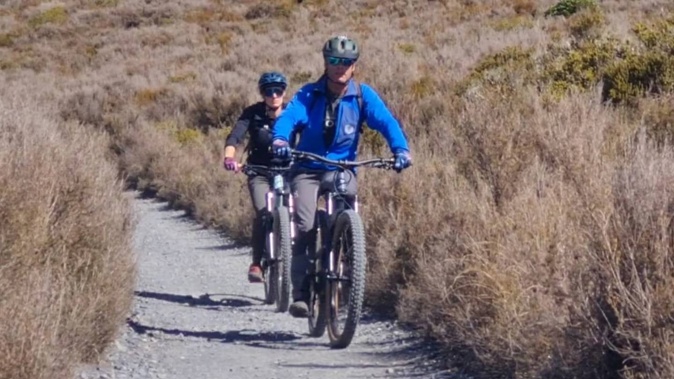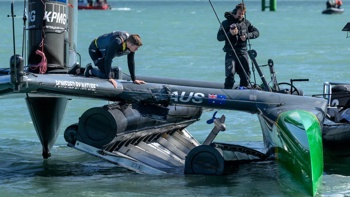
Two Swiss tourists have breached the bylaws governing Tongariro National Park by cycling on the Tongariro Alpine Crossing.
The pair have been fined $400 each and had their bikes confiscated by the Department of Conservation (DoC).
Video footage obtained by DoC shows trampers on the crossing watching as the two cyclists wind their way through the sacred landscape of the dual world heritage Tongariro National Park.
DoC Tongariro operations manager George Taylor said that to get to the point where they were filmed, the mountain bikers had to have passed signs warning that mountain biking was not permitted.
They would have had to traverse hundreds of steps, go past numerous walkers, without encountering any other cyclists.
It is an offence under the Tongariro National Park bylaws (1981) to use a vehicle, including bicycles, off formed roads.
“Mountain biking is clearly not a permitted activity - it’s an affront to those working to protect the fragile environment and cultural significance of the Tongariro Alpine Crossing to see people deliberately disregard the rules and clear communication of those,” Taylor said.
“Bicycles on walking tracks can damage sensitive alpine environments, present a safety risk to trampers and are generally disrespectful of this taonga national park.
“Our compliance officer said the pair were a little defensive to begin with but co-operated politely with his requests.”
/cloudfront-ap-southeast-2.images.arcpublishing.com/nzme/2XK66SHHWBE6NDOPEP6WAPERXA.jpg) Operations manager George Taylor with the confiscated bikes. Photo / D Van der Lubbe, DoC
Operations manager George Taylor with the confiscated bikes. Photo / D Van der Lubbe, DoC
Ngāti Hikairo ki Tongariro and DoC want to ensure the experience of the Tongariro Alpine Crossing is safe, respectful and sustainable.
Spokesperson Te Ngaehe Wanikau said Ngāti Hikairo ki Tongariro were deeply concerned to hear mountain bikes had been used to traverse the Tongariro Crossing.
“As the kaitiaki - guardians and hapū who maintain mana whenua in this area - our inherent responsibility requires we ensure the spiritual, cultural and physical safety and well-being of our sacred maunga Tongariro and that of all people who share the magnificence of Tongariro with us.
“The Tongariro Alpine Crossing is a place where people connect in a physical and, in many instances, a spiritual manner with this special environment.
“The use of mountain bikes on a track created solely for pedestrian use places both the users of the crossing and the unique environment of Tongariro at risk.
“Ngati Hikairo ki Tongariro condemns mountain biking and any other non-pedestrian activity compromising the safety and well-being of people and Tongariro.”
DoC has introduced a booking system for visitors to the Tongariro Alpine Crossing, a first step in sustainable management for the popular site.
If the tourists had booked their trip, they would have received confirmation emails containing safety and cultural information.
“Aotearoa New Zealand is precious and everyone who lives and travels here has a responsibility to look after it and respect its nature, people, and culture,” Taylor said.
“In addition, each of us needs to take personal responsibility by preparing for the location, conditions and, of course, whether the chosen activity is allowed.
“We encourage people to prepare for their trips, protect nature, and enjoy the taonga that is Tongariro National Park.”
DoC said people planning recreation on public conservation land - particularly national parks - should visit the DoC website to find out about the activities that are allowed at their destination.
Take your Radio, Podcasts and Music with you









